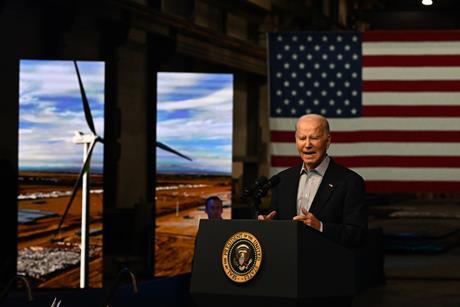2023 in the news
Much of the news this year continued to be dominated by instability around the world. Russia’s war on Ukraine shows no signs of letting up, with the destruction of the Nova Kakhova dam in June threatening to leave Europe’s largest nuclear power plant without enough water to cool its reactors. The war has also seen long-running scientific partnerships with Russia end. Researchers in Israel took to the streets in April to join mass protests against judicial reforms that many feared would erode democratic norms and harm the country’s scientific sector. These reforms were shelved following the attack by Hamas in October that led to over a thousand deaths. Israel’s subsequent efforts to eradicate Hamas have killed thousands of people in Gaza and destroyed universities there.
In happier news, the world’s first Crispr therapy was approved by the UK in November. Casgevy will be life-changing for patients with sickle cell disease and beta-thalassaemia and may be a cure for some. This exciting development is set to be followed by further Crispr therapies – clinical trials are currently taking place for HIV, cancer and protein-folding disorders.
The old adage about extraordinary claims requiring extraordinary evidence got a good outing again this year. This was the result of not one but two claims of room-temperature superconductivity. The claims by a group at the University of Rochester, US, have been doing the rounds since 2020. But in March this year the team claimed to have produced a room-temperature superconductor that functioned at pressures far lower than those previously reported for this class of hydride material. However, in November the paper was retracted as problems with the data mounted. It is the third room-temperature superconductivity retraction for this research group. The other superconductivity claim was even more extraordinary. A South Korean team claimed to have produced a superconductor that functioned not only at room temperature but also at ambient pressure. Feverish speculation followed as researchers raced to reproduce this relatively simple metal-doped lead apatite. Perhaps unsurprisingly, disappointment followed. The superconductivity supposedly witnessed could not be reproduced by other teams.
Plenty of fundamental chemistry has been on display this year too with the creation of an all-metal fullerene, caesium-based artificial atoms and an anti-aromatic ring of pure carbon. A personal favourite was a piece of spectroscopic detective work that revealed in May that the first catenane – two mechanically linked molecular rings – really had been made 63 years ago by Ed Wasserman. The claim met with scepticism at the time and the Manchester team investigating expected to find it had never been made. The story has a lovely coda though, as Ed Wasserman’s son contacted the Manchester group to let them know that his father was delighted to learn that he really had made the world’s first catenane in 1960!
ExxonMobil scientists’ climate models were accurate, but hidden
Documents show internal predictions were as good as contemporary science but executives publicly downplayed their significance
Read storyAlgorithm produces one of the best solutions to molecules’ Schrödinger equations yet
But aggressive ‘pre-training’ actually damages its predictive powers
’Photoredox catalysis goes asymmetric’: counterion strategy a breakthrough in reaction control
Ion-pairing enables chemists to reach previously inaccessible enantiomers
Second Alzheimer’s antibody approved in the US
Biogen–Eisai’s lecanemab can slow disease progression a little, but at significant cost and risk of side effects
Lipophilicity helps explain psychedelic drugs’ therapeutic effects
Understanding why psychedelic drugs that bind to serotonin receptors promote neuron growth, while serotonin itself does not
Read storyMobile mass spec provides new insight into pollutants released by East Palestine train derailment
Acrolein levels at Norfolk Southern train derailment site in late February were up to six times higher than normal
Contaminated cough syrups death toll passes 300 in four months
Deadly glycol contamination discovered in Uzbekistan, following cases in The Gambia and Indonesia
Gel capsules make reactions with organolithiums simpler and safer
Low-cost gels improve the handling and storage of traditionally dangerous organometallics, expanding applications and possibilities in synthesis
RNA building block uracil recovered from near-Earth asteroid Ryugu
Japanese mission returns pristine sample to bolster idea that prebiotic chemicals could have been delivered by meteorites
Read storyUK battery industry plans running down as Britishvolt fails
Political uncertainty risks UK losing out to China, US and EU
Indian supreme court ruling effectively ends Bhopal compensation claims from Dow
Hundreds of thousands of victims of deadly disaster still seeking support 39 years later
‘Dynamic bonds’ reshape the rules of aromaticity and chirality
Discoveries could contribute to new understanding of organic chemistry, triggering applications in catalysis and materials science
Gene-edited crops and animals get the green light in England
Legislation holds out hope for agri-biotech industry that has found itself stifled by EU rules
Read storySanctioning of 50 journals raises concerns over special issues in ‘mega-journals’
Paper mills that produce papers to order are thought to be targeting some of the biggest journals
Benzene’s forgotten isomer takes centre stage in organic synthesis
1,2,3-cyclohexatriene proves to be an unexpected hit as a reagent in a wide range of reactions
J&J proposes to pay nearly $9 billion to settle talc lawsuits
Company re-files for bankruptcy of a subsidiary in the hopes of resolving tens of thousands of claims its products caused cancer
Overlooked documents shed new light on double helix discovery
Rosalind Franklin was more than just a ‘wronged heroine’
Read storyMeet the first deaf, Black woman to earn a Stem doctorate
Amie Fornah Sankoh has persevered from failing primary school in Sierra Leone to gaining a biochemistry PhD in the US
Saturn’s rings found to be a youthful, recent addition to the planet
Nasa’s Cassini probe reveals dust and ice around the planet is only a few hundred million years old
New results vindicate suspect 63-year-old claim on synthesis of first catenane
Researchers hoping to debunk Edel Wasserman’s doubted claims of the first interlinked rings end up supporting them
2023 business in review
As war and pandemic-related cost increases and demand slowdowns continued to bite hard, the chemicals industry and parts of the pharmaceuticals sector are tightening belts: cutting jobs and costs to remain competitive.
Covid-19 therapy suppliers are bracing for a steep drop in revenues, while producers of a new crop of hormone-mimicking obesity drugs are racing to expand manufacturing capacity to keep up with soaring demand for their products.
Various sectors are fighting ongoing regulatory battles – whether over pricing of pharmaceuticals or responsibility for PFAS pollution. It seems unlikely these will be resolved very quickly.
Pharmaceuticals roundup 2023
Regulatory and pricing reforms have topped industry agendas in 2023, while weight loss drugs surged and Covid-19 therapies waned
Chemicals roundup 2023
Chemical companies entered cost-cutting mode in a year dominated by overcapacity and slow demand
Lithium-ion battery pioneer John Goodenough dies at 100
Tributes paid to the inventor of the lithium–ion battery, who has passed away a month before his 101st birthday
Read storyUkrainian nuclear plant ‘under control’ following dam breach but risk of disaster remains
Zaporizhzhia nuclear power station’s access to water for cooling from nearby reservoir cut off by demolition
Hand-built caesium-based ‘artificial atoms’ used to create ‘synthetic’ benzene
Manufactured atoms offer chemists chance to play ‘mind games’ with matter and change bond order of molecules
First publisher abandons impractical elemental analysis standard as journals eye next move
Historical ±0.4% accuracy standard was discovered to have little evidence backing in 2022
Revolutionising RSV prevention
New vaccines and a long-acting antibody aim to protect older adults and babies from respiratory syncytial virus
Read storySilicon and perovskite work perfectly in tandem to produce 30%+ efficient solar cells
Combination of materials allows higher energy photons to be captured to beat silicon’s limit
Australia greenlights psychedelics for depression while UK research falls further behind
MDMA and psilocybin are to be offered to be patients suffering from intractable mental health conditions
Scramble to replicate supposed room temperature and pressure superconductor
Professionals and amateurs are racing to recreate LK-99 a claimed superconductor that has yet to be verified
Photoactivated cycloaddition can store solar energy for decades in strained molecules
A reversible cycloaddition triggered with visible light offers new opportunities for solid-state energy storage
Read storyJustice for Henrietta Lacks as family reaches settlement with Thermo Fisher
Company was accused of profiting from HeLa cells derived from Lacks’ tumour without her family’s approval
A giant leap for ‘quantum superchemistry’
Ultracold atoms can undergo chemical reactions all at once
Controversial plan will see Fukushima’s radioactive wastewater discharged into sea
As contaminated water builds plant’s owner hopes to begin discharging it this summer
’This is just the beginning’: RNA editing set to democratise viral engineering
Crispr-based system could ease development of novel RNA therapies
Read storyUnderstanding chemistry at play in RAAC explains weakening of concrete
Autoclaved aerated concrete corrosion issues puts some buildings at risk of collapse
Lithium discovery in US volcano could be biggest deposit ever found
Find could point to new ways to prospect for material in high demand for batteries.
Oxygen-28 is the heaviest oxygen isotope ever seen
Nuclei expected to be ‘doubly magic’ but experimental observations cast doubt on this
The quantum dot story
Julia Robinson explains how quantum dots went from a theoretical prediction to everyday reality and earned Alexei Ekimov, Louis Brus and Moungi Bawendi the 2023 Nobel prize in chemistry
Read storyRow erupts over funder’s decision to suspend diversity panel following government pressure
Science minister Michelle Donelan demanded a response from UKRI after accusing members of the panel of ‘extremist views’
Berkeley Lab to lead US hunt for element 120 after breakdown of collaboration with Russia
Fallout from Russia’s invasion of Ukraine sees US go it alone on efforts to synthesise new elements
Labs stand empty in Israel while fate of Gazan universities hangs in balance
As war rages in the Middle East, the plight of Gazan scientists is unclear as international students and researchers leave Israel and scientists are called up to fight
Argentina’s new populist president has the country’s scientists worried
Researchers seek dialogue with new leader who plans to eliminate the nation’s science ministry and possibly its research council
Read storyNorthvolt to bring sodium-ion batteries to European market
Swedish firm highlights cells’ cheap and sustainable materials for energy storage
Solvation of single sodium ion tracked in real time
First steps of solvation monitored as single sodium ions dissolve in helium droplets
UK becomes first country in the world to authorise a Crispr-based gene therapy
Treatment aims to cure patients with β-thalassaemia and sickle-cell disease
Life-saving cancer gene therapy under investigation after being linked to rare secondary cancers
US drug agency examining six CAR-T therapies after reports of T-cell malignancies
Read storyRobotic chemistry lab joins forces with Google AI to predict then make new inorganic materials
Algorithm discovered more than 2 million inorganic structures
New catalytic process completely breaks down nylon-6 in minutes
US chemists report the mildest conditions to date for Nylon-6 depolymerisation, recovering 99% of the original monomers in the plastic
‘Dolomite problem’ that has puzzled scientists for centuries may have finally been solved
Solution helps to explain the mystery of why common mineral won’t crystallise in the lab





































